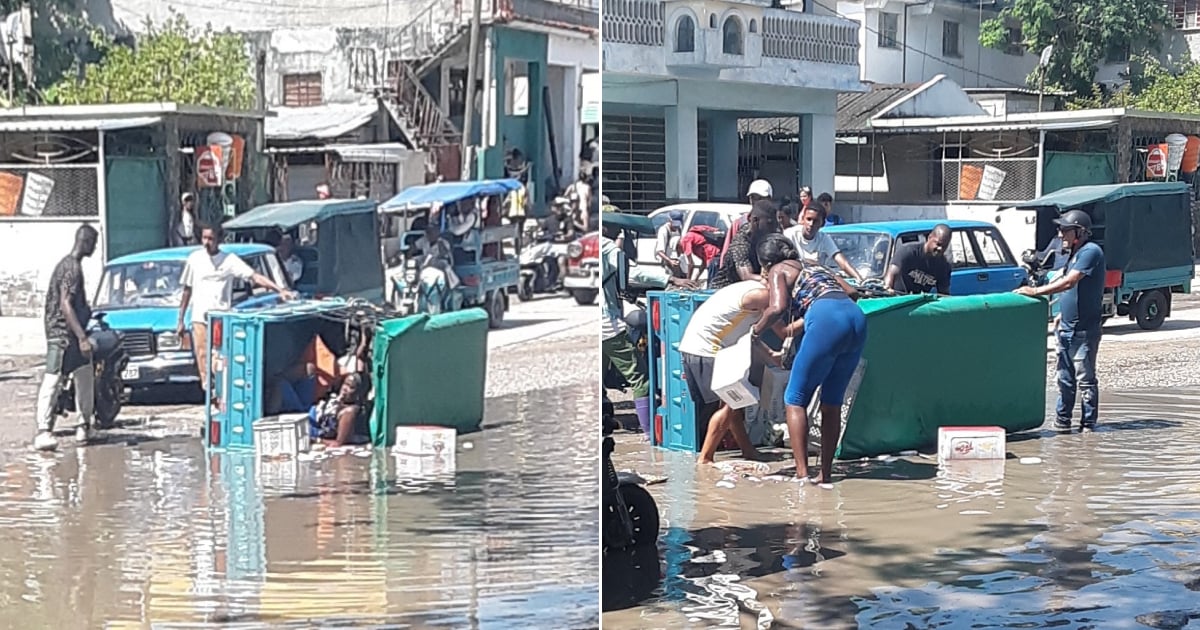An electric tricycle carrying several passengers overturned on Tuesday on a busy avenue in San Miguel del Padrón, Havana, after hitting a large, water-filled pothole. Fortunately, those on board escaped unharmed. The incident took place on San Miguel Road, near the hardware store in the La Cuevita area, a bustling part of the Cuban capital, according to a report in the Facebook group “ACCIDENTES BUSES & CAMIONES por más experiencia y menos víctimas!”
Images shared in the post show the unfortunate scene. One photo captures the tricycle on its side in the flooded street, with passengers still inside the vehicle, sprawled in the rainwater-filled hole, likely due to the recent heavy rains in Havana. Another image depicts several bystanders, ankle-deep in water, assisting the driver in righting the tricycle, while a drenched woman attempts to retrieve her belongings.
“This just happened in front of the La Cuevita hardware store in San Miguel del Padrón, Havana, Cuba. Once again, the danger posed by electric motorcycles is evident. They are meant for cargo, not for passengers,” remarked Juan Lamas Martínez in the post.
However, the tricycle's driver, Paul Hernández, commented, “I was the one involved in the accident, and I'm not a taxi driver. I was out to get supplies for my business, and while some people helped me, others took advantage and stole from me, despite my friends hitting their heads hard. That is a massive hole in the road.”
The post quickly garnered numerous reactions from group members who disagreed with blaming the tricycle for the accident. Many criticized the poor condition of roads in that municipality—and throughout Havana—with deep potholes filled with rainwater or sewage, placing the blame squarely on government authorities for neglecting a long-standing issue that jeopardizes public safety.
Some pointed out the lack of public transport in Havana, forcing residents to rely on alternatives like tricycles, motorcycles, and pedicabs for daily commutes. “Thanks to these bikes, people are getting around because if you wait for a bus, you'll never reach your destination. It's clear the road is broken, full of holes and water, making it impossible to see them,” one man argued.
“I'm sure it's the potholes and sewage water in the street that create this situation. It's easier to weld a pipe or fill a pothole than to eliminate a mode of transport essential for the population's mobility,” a woman added.
A young woman questioned, “Maybe it's not the right vehicle for passengers, but do you know how bad the roads are, especially between Route 10 and the baseball stadium? It's terrible for bikes, cars, even buses. It's not just electric bikes that have accidents; the issue here isn't the tricycles but the poor work by Viales.”
One user opined, “Electric scooters aren't dangerous; the danger comes from who drives them and the terrible road conditions,” while others pointed to speeding, driving in the wrong lane, and reckless overtaking by drivers of these vehicles as potential causes.
Both electric and gasoline-powered tricycles have become increasingly popular in Cuba as public transportation struggles. The widespread use of electric tricycles has surged since 2024, but this growth hasn't been matched by the necessary infrastructure or training to ensure their safety on the roads. As a result, accidents involving these vehicles have risen, exacerbated by inadequate regulation and poor road conditions.
One of the most tragic incidents occurred in December 2024 in Havana, where a child died and three family members were injured in a multiple-vehicle accident involving a truck and a tricycle. Another collision in Sancti Spíritus between a Special Brigade vehicle and a tricycle resulted in several injuries.
According to official statistics released this week, 1,738 accidents were reported in Cuba from January to March, 144 fewer than in the same period the previous year. The number of injuries also decreased to 1,514—87 fewer than in 2024. However, the total number of fatalities increased from 146 to 173, marking 27 additional deaths.
Understanding the Rise of Electric Tricycle Accidents in Cuba
What caused the electric tricycle to overturn in Havana?
The electric tricycle overturned due to hitting a large, water-filled pothole on a street in San Miguel del Padrón, Havana.
Are electric tricycles considered safe for transportation in Cuba?
Electric tricycles have become a popular mode of transport in Cuba, but safety concerns arise due to inadequate infrastructure and road conditions, as well as a lack of proper regulation.
How have road conditions in Havana contributed to traffic accidents?
Poor road conditions, including deep potholes often filled with rainwater or sewage, have been a significant factor in causing traffic accidents in Havana.
What are the official statistics on traffic accidents in Cuba for early 2024?
Between January and March 2024, Cuba recorded 1,738 accidents, a decrease from the previous year, with 1,514 injuries reported. However, fatalities increased to 173, up by 27 from the previous year.
